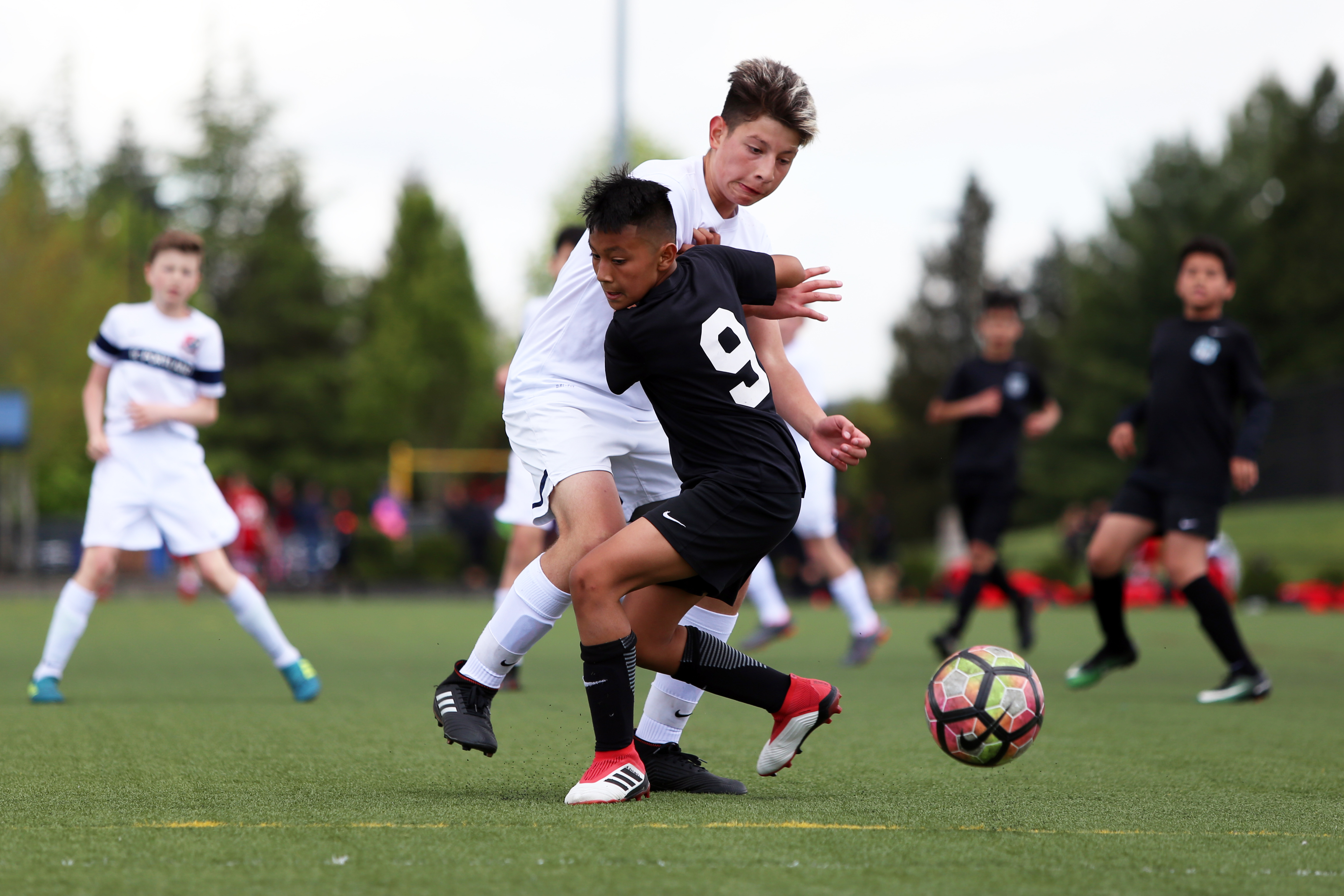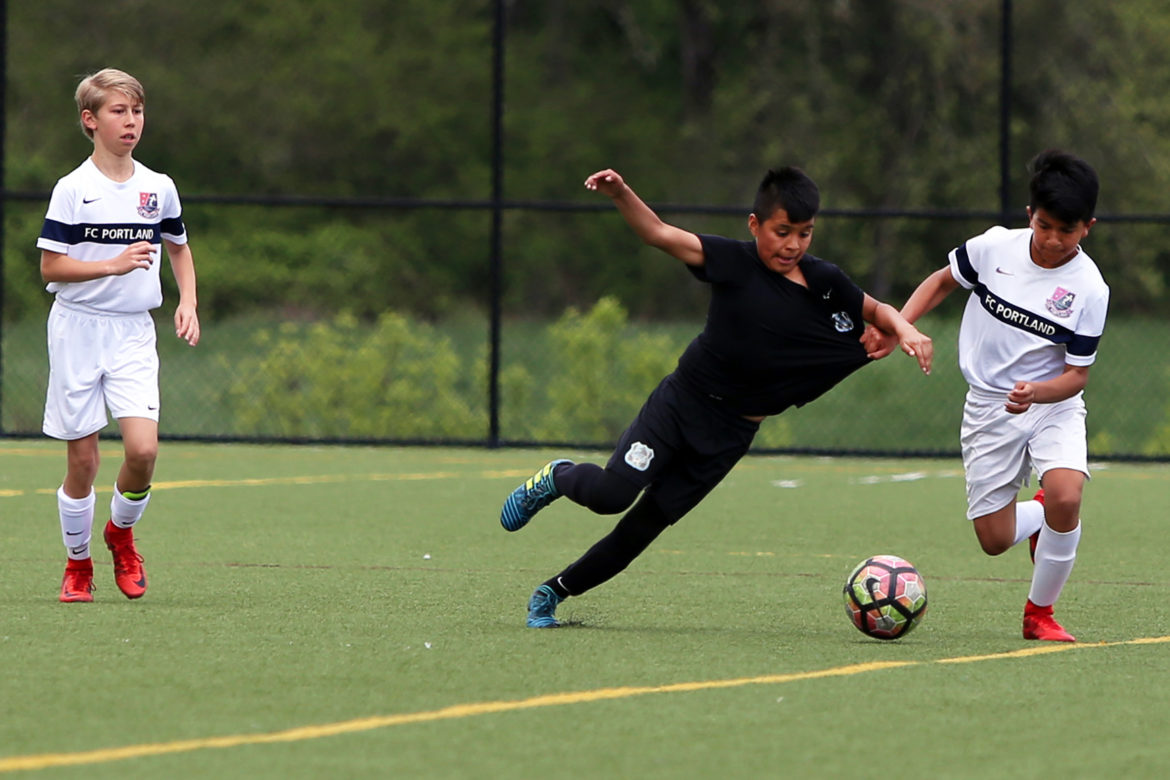Organized Latino clubs shake off an “ice it and play” attitude toward injuries — including concussions — while rising in the ranks
Coach César Fragoso yells for the kids to stop. He walks over to a player and tells him what he did wrong. “You hesitated,” he says in Spanish, loud enough for the rest of the team to hear. “You must play with decision. Don’t hold the ball at your feet, other players are coming for you.”
The boy is turning red.
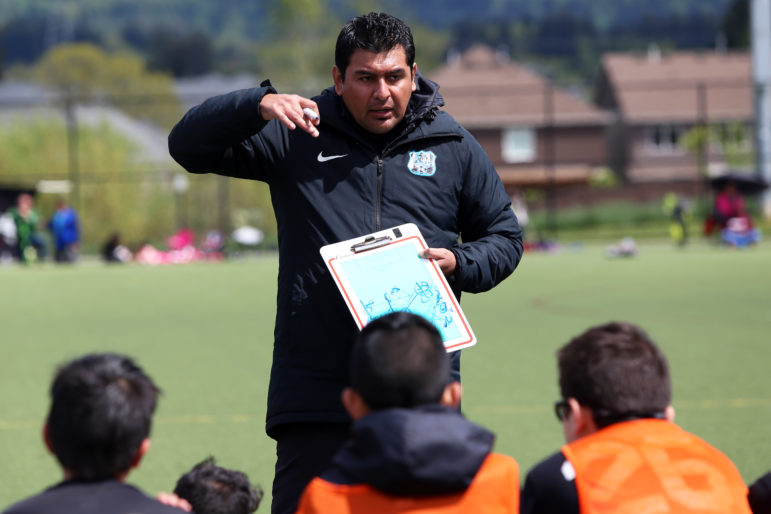
César Fragoso, coach of the Cuervos FC, has quickly established his youth soccer team as one of the top clubs in Oregon.
“Touch the ball with a decision already made.”
The other players on Cuervos FC watch without looking away. None of them begins a side conversation.
“OK, resume.”
Fragoso drops the ball and returns to the sideline.
Cuervos is a new team on the club soccer scene. José Alberto Vasquez is president of the club and recruited coaches like Fragoso, a former professional player in Mexico, to rally Latino athletes from unranked clubs, casually organized games between Latino kids in what’s known as the “Barrio Leagues” or “Mexican Leagues” to compete against the highest ranked teams in Oregon. Other clubs have Latinos on their rosters, but Cuervos’ raison d’être is Latinos.
The Barrio League matches, complete with food trucks and mariachi soundtracks, provide a cultural experience and some very good soccer.
“I grew up playing in the Mexican leagues,” says Marco Farfan, left back defender for the Portland Timbers. “Taco trucks, music, I loved it.”
But the Gresham native, who was selected for Major League Soccer’s Homegrown Game in Atlanta this week, says the emergence of teams like Cuervos offers young Latino players more options.
“I think it’s great,” Farfan says. “Even though I came from Eastside Timbers, I root for teams like Cuervo,” he says laughing.
Following Jenna’s Law
One benefit of playing on a team like Cuervos, which is based in Gresham, may be greater attention to player safety.
Like many of the best soccer teams in Oregon, Cuervos operates outside of the public school system, under the authority of the Oregon Youth Soccer Association.
![]() Such teams — more than 1,000 in the state according to OYSA — are required to comply with Jenna’s Law, legislation passed in 2013 aimed at reducing head injuries in recreational sports.
Such teams — more than 1,000 in the state according to OYSA — are required to comply with Jenna’s Law, legislation passed in 2013 aimed at reducing head injuries in recreational sports.
The law requires coaches to undergo annual training to help them identify the signs of a concussion. Vasquez and Fragoso had theirs nine months ago, in Spanish.
Parents and children are given information about concussions, the signs and dangers of getting them.
“We sign these forms and give over our insurance information,” says Rocky Munoz, whose son, Fito, plays for the team.
The OYSA offers a graded return-to-play guideline as well as a fact sheet on concussions produced by Providence Health. The document is available on OYSA’s website and distributed to member clubs, such as Cuervos. Vasquez says his coaches have concussion materials written in both English and Spanish.
That kind of support is lacking in the Barrio Leagues, Farfan says.
“When you’re playing in a rec club and you get a concussion, you go with your parents to the hospital and it’s up to your family to handle it,” Farfan says. “Here the trainers do everything. They have doctors who walk you through the whole thing.”
Combating ‘machismo’ culture
Farfan says he’s had a few concussions. “The worst ones are where you aren’t sure they’re concussions, and you want to play, you think you can play, but [trainers] sit you down and say ‘No, you aren’t playing.’”
Fernando Pessoa, coach for the U-13 (for players under 13 years old) Timbers development team, says players may be more receptive to advice from a coach.
“When a kid gets injured, they have to talk to the doctor and that can be uncomfortable,” Pessoa says. “Part of our job as coaches is to help them mature, to talk about what’s uncomfortable to talk about.”
Farfan says that’s a change from the soccer culture he grew up with.
“Growing up playing in those Mexican leagues, there was an attitude of ‘ice it and you’re fine, go play.’ You know, parents would say ‘séa valiente [be brave],’” Farfan says. “But I think it’s changing, I think it’s changing for the good.”
Vasquez says that kind of machismo, the stigma of boys being seen as weak for talking about injuries, is gone from today’s game. “This generation is different.” he says. “The kids tell César what they’re feeling when they get hit.”
Still, there are a few studies that show young Latino athletes are less likely than other racial and ethnic groups to report having had a concussion and that Latino parents view concussions less seriously than other parents.
During the conversation about head injuries, which is conducted in Spanish, Vasquez does not use the Spanish phrase for concussion, which is “conmoción cerebral,” instead he uses phrases like “golpe” or “daño a la cabeza” which mean hit or damage to the head, respectively.
The formal translation is so rare that of the dozen or so parents, coaches and kids interviewed for this article, none of them used it.
Still, regardless of the name, Vasquez says he understands the importance of recognizing and treating concussions. “We look out for signs like dizziness or nausea” he says.
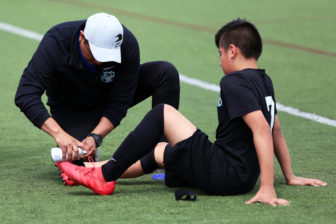
Cuervos club president Jose Alberto Vasquez, shown here attending to his son, Edison, says his coaches take injuries, including concussions, very seriously.
Munoz, the Cuervos parent, says he’s not worried for his son’s safety.
“They tell us about [concussions],” he says. “It’s a risk like in every sport. I trust them.”
Importing an ethos
Nico Lampros, 12, is at a recent Cuervos practice, reading Fragoso’s body language as the coach corrects a teammate’s footwork. Nico doesn’t know Spanish. He watches these lectures without subtitles, eyeing Fragoso’s gesticulations, turning to teammates afterward to translate.
For him, these three-day-a-week practices have been as much about learning Spanish as soccer.
For Vasquez and Fragoso, Cuervos FC is more than just coaching in Spanish.
Like certain Mexican cheeses, they are trying to import something they struggle to find here in Oregon. An ethos, a play-in-the-street-until-dark way of living, inculcated from birth, a fútbol culture they feel gets lost in transition to America.
“César treats this team as if it was professional, even though the kids are too young to be thinking that way,” Munoz says.
On game day morning, Fragoso has the kids eat breakfast together, like a platoon in boot camp. During travel, Fragoso asks the parents to book rooms in the same hotel, so he can screen game film.
“He will say ‘7 to 9 we’re going to be in this room,’” Munoz says. There, the kids will watch past Cuervos matches and even opposing teams’ games, while Fragoso narrates, looking for an edge.
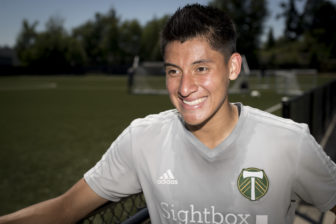
Portland Timbers defender Marco Farfan who grew up in Gresham, said teams like Cuervos FC give Latino youth a chance to play in a league with more support – and more attention to safety.
Munoz says that prior to Cuervos, his son, Joshua, played in the “Barrio Leagues,” competitions between unranked and unregulated teams, backyard-style games organized outside the Oregon Youth Soccer Association league, where lopsided scores are common. “Like 10-1,” Munoz says.
Cuervos, by contrast, competes against the top-ranked teams in the OYSA league, competing year round in championships like state cup.
At practices there is regular mention of the clubs they mean to dethrone: Eastside Timbers, Portland FC, Westside Timbers. The kids recite them, like Arya Stark in “Game of Thrones,” honing their skills in anticipation of the day they will meet.
“This isn’t day care,” Fragoso says after one practice, speaking in Spanish. “That’s one issue we have with some parents. We tell them they can’t just drop their kids off and leave them here. If a kid doesn’t have any interest in soccer, what am I supposed to teach them?”
“For the parents, sometimes it’s hard,” Munoz says. “Because the practices are three or four days a week and sometimes he keeps them after dark, and we just want to get home after work.” He laughs, adding, “but I wouldn’t have it any other way.”
“It’s like a family,” says Tom Lampros, Nico’s dad. “The players really do respect the coaches. They instill the kind of respect for elders …”
He stops himself, searching for a way to explain. “Well, see, my wife is Mexican and I’m Greek,” he says. “We both come from traditions that look to elders, that respect grandparents, and this club teaches that. Like, all the kids shake my hand when I walk up.”
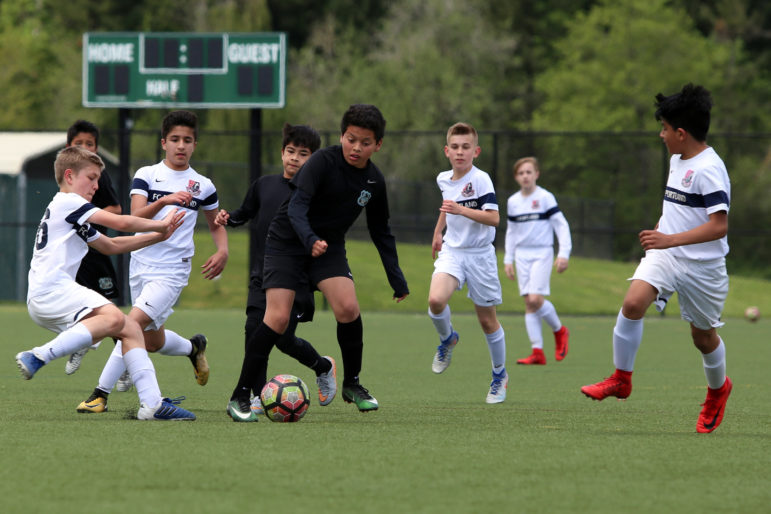
Cuervos players like Fernando Barientos are coached to decide where they want to pass the ball before they even touch it.
Clipboard corrections, Trojan Horses
Fragoso’s English is staccato and accented and he almost never uses it. While many immigrants fear speaking their native tongue too loudly in public, Fragoso speaks Spanish without apology. His voice, baritone and raspy from a week of yelling, rings out across sleepy Saturday morning soccer fields, making the unprepared jump, the way a car stereo left on loud does when you start it up again.
During halftime breaks, it is common for kids on opposing teams to return to their benches and rummage through their gear or carry on non-soccer-related conversations. For Cuervos, the half time is a mix of existential reflection and a beating of the shields.
Fragoso demands his players’ attention. And even if Cuervos is leading at the half, his speeches begin with what went wrong.
“Do you want to play?” Fragoso asks a player during one mid-match break. “You’re a good player, but it’s like you don’t want to be here.”
He uses his clipboard to circle defensive lapses. None of the players are immune from critique. But when the young players are sufficiently broken down, looking into their Gatorade bottles with a thousand-yard stare, their coach shifts into how to beat the opposing team, how he’s discovered their weakness, and then the 12-year-olds take on a giddy, conspiratorial tone; the look of Greek soldiers learning of the Trojan Horse for the first time.
On the sidelines, Fragoso roams freely outside the technical box, his dress shoes at the edge of bounds, issuing commands. “Stand back 10 feet, coach!” a referee warns, after colliding with him on the sideline. Fragoso looks at the referee as if the official were a confused pedestrian and carries on as before.
When the kids get the ball and counterattack, Fragoso’s voice crescendoes, like a Telemundo broadcast, calling out player names — “Chew-KEEEEY!” — with melodic emphasis on certain syllables — “Josh-OOH-AHHH!”
Pursuing excellence
Cuervos’ methods seem to work. The team sprang into existence less than a year ago and rose briefly to second in state rankings, before dropping to its current position, fifth.
The team captain is Victor Adolfo, 12, though out here he goes by his nom de guerre, “Chucky” (pronounced Chew-KEY). During the first game of the year, Chucky was deemed enough of a threat that the opposing Medford team assigned two defenders to guard him.
This is his last tour with Cuervos FC. In a short period he has become something of a legend to the kids, receiving an invitation to attend the esteemed Timbers Academy, run by the Portland Timbers, at the end of the season. He will be one of six Latinos on the 20-member team.
But effective methods can seem cruel at times. In one practice, a 12-year-old was busted down in rank, forced to practice with a younger age group, for daydreaming. Fragoso even pointed to him, as he toiled away with 11-year-olds, to remind his teammates of what fate awaits them should they start acting like “niñitos” (little kids).
They are not out here late on a Wednesday to have fun, but to learn. Enjoyment is not the aim, though it is a welcomed aspect of the experience, like a runner’s high, a by-product of the pursuit of excellence.
Upon returning from exile, the banished player was told, in full view of the rest of team, to collect all of the soccer balls before rejoining the older group.
The expectation of personal responsibility extends beyond Fragoso’s players. When I arrived late to one practice during my reporting, the coach suggested I run laps for tardiness.
I laughed, but he didn’t.
Séa valiente
Fragoso is teaching these 12-year-old boys how to conduct themselves when they become men, for better or for worse, through soccer. After every game he huddles the kids together and tells them to find and hug their parents. He preaches respect for elders, but he also shows the kids that deference is not always the way.
The Cuervos FC coaches see the other top clubs as better funded and more white. They worry about bias in officiating. Once Fragoso threw his hands up and openly questioned a referee after stoppage time was added to extend a game, giving the other team the possibility of a comeback.
“Extra time?” he asked, a rare time he used English on the pitch. “Why? Only when Cuervos plays you give extra time!”
“Put your hands down, coach,” the referee yelled back.
Fragoso kept them up.
“One more time and you’re out of here,” the referee said, whistle in mouth.
“Whatever,” Fragoso said, putting his hands down, and shrugging.
The two stared at each other until the referee blew the whistle and play resumed.
Cuervos came up short in its bid for the state cup, but the team still had a chance to test themselves in the ultimate contest: a friendly match against the professional Timbers U-13 team at the Adidas Timbers Training Facility in Beaverton.
They are trying to import something they struggle to find here in Oregon. An ethos, a play-in-the-street-until-dark way of living, inculcated from birth, a fútbol culture they feel gets lost in transition to America.
The two teams cannot play ranked games against each other, since Cuervos operates under the Oregon Youth Soccer Association and has no standing in the Olympic Development Program that governs the Timbers’ developmental teams and is overseen by the national U.S. Youth Soccer program.
There are other differences. Cuervos practices three days a week, the Timbers practice four. Whereas Fragoso keeps kids a little past 7 p.m., Timbers coach Fernando Pessoa keeps them until 9 p.m.
The young Cuervos team has risen to the top of the OYSA ranking relying on its tightness as a group, its ability to communicate with teammates, and pass the ball with faith to one another. But against a professional team like the Timbers, the kids learned a lesson that follows all professional tracts: Everybody can do what you can do at the next level.
Cuervos lost 3-1.
It was a loss that came with a kind of pride, like the defeat of the 300 Spartans at the Battle of Thermopylae, where the challenge meant more than the outcome.
“Look how close we came to victory,” Fragoso said to the kids in Spanish afterward. “This team selects players from all of Oregon and they had trouble beating you.”
As Fragoso was grabbing his gear to leave, Timbers coach Pessoa approached Fragoso and shook his hand. “Good job, coach,” said Pessoa, a native of Brazil, who speaks Portuguese and Arabic, but little Spanish.
The two spoke pidgin English, on a Saturday in the Pacific Northwest, and discussed bringing more players from Cuervos FC into the Timbers Academy.
*
Share your experience: If you or your child participated in youth sports and would like to share your an experience about a concussion, please send an email to rattled@pamplinmedia.com, or join our Facebook group at facebook.com/groups/Rattled

